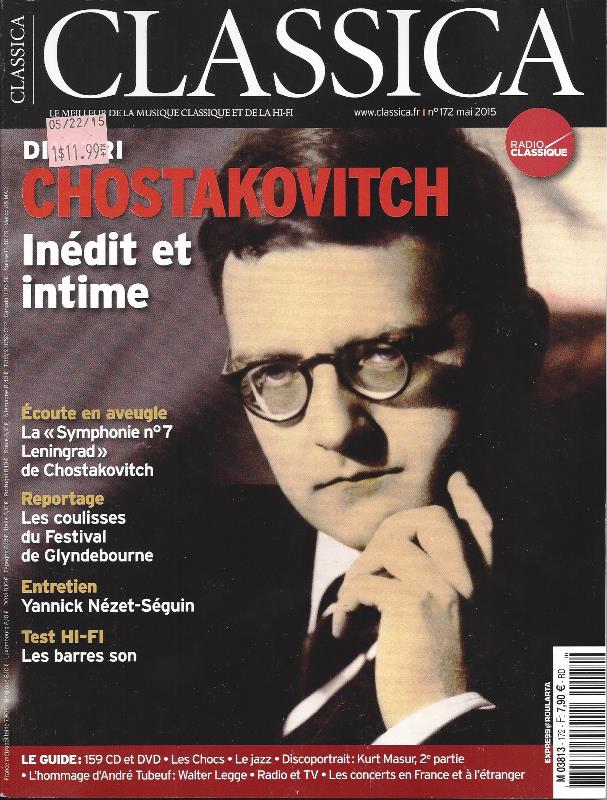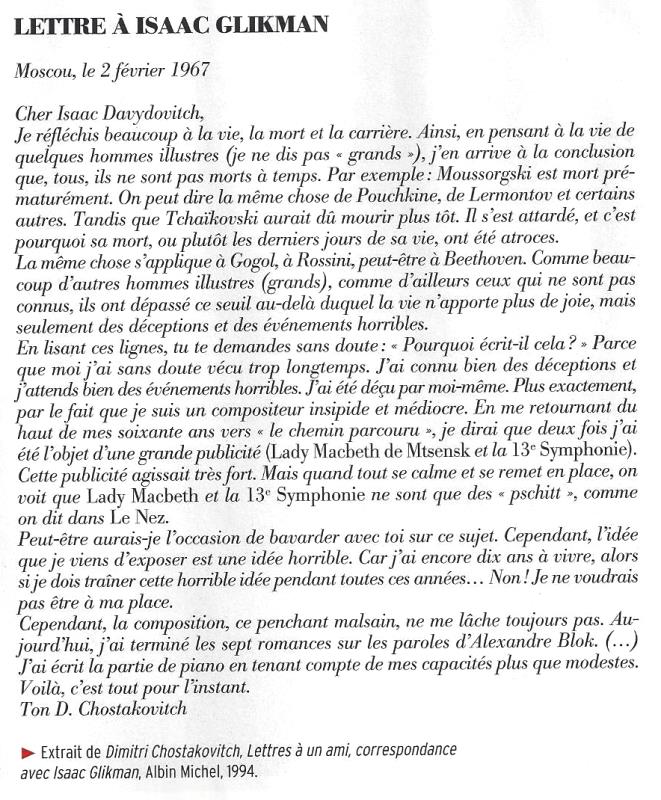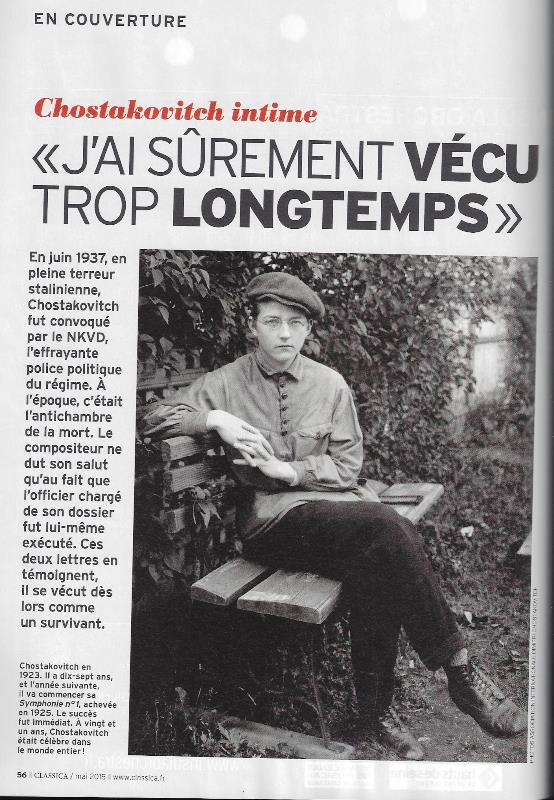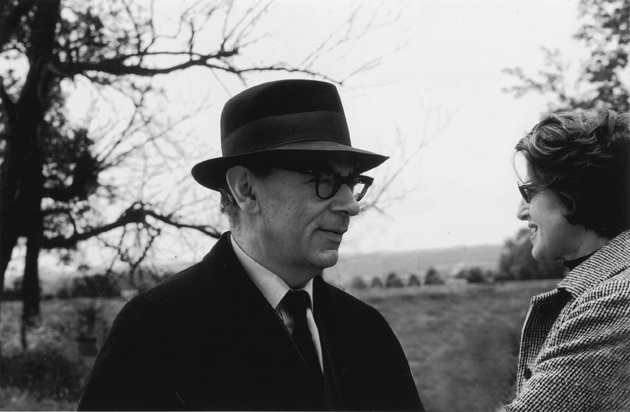Shostakovich at Oxford
The following letter from Isaiah Berlin to his friend Rowland Burdon-Muller about Dmitry Shostakovich’s visit to Oxford appears in Berlin’s Enlightening: Letters 1946–1960, to be published in the US in late July. The book marks the hundredth anniversary of his birth in 1909.
Berlin and his wife Aline were hosts to Shostakovich when he came to Oxford to receive an honorary degree of Doctor of Music on June 26, 1958. Francis Poulenc, similarly honored, stayed with the historian Hugh Trevor-Roper and his wife, whose house was the venue for a joint musical gathering.
—Henry Hardy and Jennifer Holmes
June 28, 1958
Dear Rowland,
…Poulenc and Shostakovich have come and gone. Goodness, but it was a business. First a great fuss about the British Council which had arranged elaborately for a musical party for S. on Monday night (we were to entertain him on Tuesday and he was to get his honorary degree with Macmillan and Gaitskell on Wednesday), but the Soviet Embassy appears to be engaged in some kind of warfare with the British Council and more or less forbade him to have anything to do with them. The result was that the party was held without him, much bad blood, general indignation, telegrams, anger, tears. He finally materialised on Tuesday, and it was a wonderful business.
First there arrived in our drawing room a very stiff and upright, rather handsome young Soviet official, who said: “I wish to introduce myself. My name is Loginov.
The composer D.D. Shostakovich is in car outside. We were told you were expecting him at 4:00. It is now 3:00. Do you wish him to remain in car, or what?” We explained that we were expecting him at 3:00, and it would be perfectly permissible for him to enter straight away. Whereupon the car was ceremonially driven in, another Soviet official leapt out, and finally the composer himself appeared, small, shy, like a chemist from Canada (Western States), terribly nervous, with a twitch playing in his face almost perpetually—I have never seen anyone so frightened and crushed in all my life—he re-introduced the two Soviet officials as “my friends, my great friends,” but after he had been with us for a bit, and the Soviet officials were got out of the way, he never referred to them as that again, but only as “the diplomats.” Every time he mentioned them a curious expression of angst appeared on his face, rather like the expression which sometimes enters Aline’s face—indeed on the last morning of all when he was waiting for the two officials to appear and was in a state of utter panic and despair, I said in English (which he does not understand) to Aline, who was also looking rather distraught, that the expression of their faces was identical. Anyway the problem was how to get Shostakovich to stay to dinner and go on to the musical party given in the Trevor-Ropers’ house for him and Poulenc, and how to get rid of the two Soviet officials, who would cast a terrible frost on the occasion. In the end, I announced firmly to them that the University had a strict set of rules which it obeyed: under these a University official would appear in half an hour, and take them off to dinner in New College, after which they would be allowed to see a play (by David Pryce-Jones), while for Shostakovich an entirely different arrangement had been made. This they took calmly—after glancing at one another to see if it was all right—and bowed their heads submissively. The University official duly called, some unfortunate Fellow at New College was suborned to look after the two “diplomats,” and Shostakovich was left with us.
His manner brightened. But throughout the visit he looked like a man who had passed most of his life in some dark forbidding place under the supervision of jailers of some sort, and whenever the slightest reference was made to contemporary events or contemporary personalities, the old painful spasm would pass over his face, and his face would assume a haunted, even persecuted expression and he would fall into a kind of terrified silence. It was depressing and very harrowing, and made one like him and pity him a great deal. In due course the other guests appeared, Poulenc, Cecile,
he listened to it calmly, said to me that the cellist was good, and the pianist very bad (which was perfectly true), and complained to the cellist that he had played two passages incorrectly.
Advertisement
The cellist flushed, produced the score, and S. saw that the score bore out the cellist. He could not think how this could be, suddenly realised that it had been edited [by] Piatigorsky, who had of course altered the score arbitrarily to please himself; this was the moment at which he came nearest to real rage, took out a pencil and violently crossed out Piatigorsky’s forgeries, and substituted his own original version. After that his brow cleared, and he returned to his little corner. Songs by Poulenc were then sung by Miss Margaret Ritchie,
and something else, but his music could not be listened to any more, the decadence of the Western world had alas become all too apparent. While playing, S.’s face really had become transformed, the shyness and the terror had gone, and a look of tremendous intensity and indeed inspiration appeared; I imagine that is how nineteenth-century composers may have looked like when they played. But I do not think it has been seen much in the Western world in the twentieth.
After that he ceased playing and various people wished to be presented. He showed the first violin of the Philharmonia Orchestra how to play the second and third movements of his concerto; he told Desmond Shawe-Taylor
felt moved, and said so in various ways afterwards. It really was an occasion and an experience.
After this, at home, he did talk a little, complained about no piano, discoursed on his musical taste, and went to bed almost happy I think. Meanwhile his two guardians went to an undergraduate party at New College, then to the Exeter Ball, had a tremendous time, exchanged insults and pleasantries with undergraduates and dons, and obviously enjoyed themselves. Very nice they turned out to be—they may have had their hands dripping with Hungarian blood, but personally they were innocent, rather wooden peasants, who obviously at an order from above would have had no compunction in shooting one dead, but at the same time had a certain charm.
On the next day the nervous tic began in S. again, he went through the horrors of the degree ceremony, was terribly embarrassed at meeting various people who spoke Russian at the All Souls luncheon, was always taking cover with me, who after all was an accredited representative of the University registered by the Soviet Embassy as such. People asked him intolerable questions such as “What has happened to your second, third and fourth symphonies?”—admirable works condemned by the regime. He would answer lamely, “They were not a very great success,” which was literally true, but he suffered as he spoke. An absurd incident occurred when Lord Beveridge,
aged 84, tried to present him with a bunch of flowers—too large for a buttonhole, too small for a proper bouquet, which he had been charged to give him by some dim Welsh composer, and chose the middle of lunch to do so. Poor S. got up, mumbled, Beveridge, who was out of his mind, also mumbled, and they were taken apart with difficulty. Various White Russians tried to engage him in conversation, naturally enough, and he managed to disengage himself with enormous effort and agony. Finally we took him home, dressed him in a white tie and sent him to dine at Christ Church with the other recipients of honorary degrees, such as the Prime Minister, Gaitskell etc. He came home more dead than alive, but got up early the next morning and presented us with scores of three works with suitable inscriptions, and even talked a little about his wife and children.
Advertisement
At 10:00 AM the guardians were to call for him, but they were late. He got into a state of appalling nervous panic, made me ring the Mitre Hotel three times, began to wring his hands, wondered what would happen if he arrived late at the Embassy, how he would explain it, wondered whether his guardians had somehow abandoned him, or some mistake had been made for which he would be blamed, and got into an appalling neurotic state. However, they appeared, explained they were late because they had been buying guides to Oxfordshire at Blackwells, and took him off. I was invited to lunch with him in the Soviet Embassy next day, but refused. S. had seen enough of me, and knew enough about me to realise that I understood his position too well, and that I thought that it would be better for him to meet all the British musicians etc., whom he would meet in London through interpreters, and without being self-conscious about an observer understanding his reactions a little too well. So out of a kind of delicacy—I think you will agree it was not inappropriate—I refused, and that was that.
The whole thing has left me with a curious sensation of what it is to live in an artificial nineteenth century—for that is what Shostakovich does—and what an extraordinary effect censorship and prison has on creative genius. It limits it, but deepens it.
I must stop and go
down to lunch with Peter and his school friends assembled round the
table, but S.’s face will always haunt me somewhat, it is terrible to
see a man of genius victimised by a regime, crushed by it into accepting
his fate as something normal, terrified almost of being plunged into
some other life, with all powers of indignation, resistance, protest
removed like a sting from a bee, thinking that unhappiness is happiness
and torture is normal life….
Yours ever, with much love,
Isaiah
Trên tờ Điểm
Sách Nữu Ước, NYRB số đề ngày 10 tháng Sáu, 2004, Orlando Figes điểm
hai cuốn
sách mới xuất bản, viết về nhà soạn nhạc lớn lao của Liên Xô,
Shostakovich [một
nhân vật được coi là li khai, chống đối chế độ...], cho biết, Shos. đã
từng ký
tên trong danh sách đăng trên tờ Sự Thật., tố cáo nhà bác học nguyên tử
của
Nga, Andrei Sakharov.
"Không
ai bắt ông ta phải làm như vậy." Bạn của Shos, Lev Lebedinsky nhớ lại. Và tác giả bài viết giải thích: Đây không phải
hành động của một con người phản kháng, như ông đã từng, mà của một con
người sống
quá lâu trong nỗi sợ hãi.
Hai mươi năm
sau khi Stalin mất, ông ta vẫn còn sợ Ông Trùm Đỏ! (1)

GCC, điếc đặc
nhạc cổ điển, nhưng cái tên Chostakovitch, lại thêm inédit, chưa từng
in ấn, intime,
cõi thầm kín…. làm sao bỏ qua!
Quả là không
bõ công mua. Chỉ nội bức thư dưới đây.
GCC nhớ hoài
hai giai thoại về ông này. Một, là thời gian thất sủng, chỉ chờ Cớm VC
Niên Xô
[KGB] tới bắt, ông bèn nằm hành lang, nhà của mình, để cho vợ con không
đau lòng
vì cảnh bi thương này!
Tuyệt. Chỉ 1
chi tiết như thế là thấy Bắc Kít không có tên nào làm được!
Thứ nhì, ông
này đếch thèm ký tên vô danh sách kêu gọi Bắc Bộ Phủ Cẩm Linh thả
Brodsky, sau
khi hỏi, tên thi sĩ này có phải đã từng gặp tụi [ký giả] Tây Phương.
Nghe nói,
có, thế là ông ta lắc đầu, gặp tụi nó là bị mua rồi, hỏng rồi!
[Trong trò
chuyện với Brodsky của Volkov có kể chuyện này]
Số này tuyệt
lắm. Nói tới bản nhạc thần sầu của ông, Symphonie 7, Leningrad.


Tớ rõ ràng
là sống quá dai, quá cả cái thời của tớ!
Nơi người chết mỉm cười
Shostakovich : Cello Concerto in E flat, Op.104
WHOSE
SIDE WAS
SHOSTAKOVICH ON?
by Alex Ross
RUINED CHOIRS
How did Shostakovich's music
survive Stalin's Russia?
For genuine
dissidents, such as Solzhenitsyn and
Brodsky, Shostakovich was part of the problem. In an interview,
ironically,
with Solomon Volkov, Brodsky attacked the effort to locate "nuances of
virtue" in the gray expanses of Shostakovich's later life. Such a career
of compromise, Brodsky said, destroys a man instead of preserving him.
"It
transforms the individual into ruins," he said. "The roof is gone,
but the chimney, for example, might still be standing."
Cái trò ‘dạng háng’, ‘biển
một
bên, tớ một bên’… huỷ diệt một con người thay vì giữ được nó… Nó biến
con người
thành tro than, điêu tàn… Mái nhà thì mất mẹ nó rồi, nhưng cái ống
khói, có thể
vưỡn còn!
Note: Cái đoạn gạch đít ở trên, áp dụng vào đám tinh anh Bắc Hà [HC, LD... trừ Hữu Loan], thật hợp!
Late at night, Ragin broods over his condition: "I am serving a bad cause, and I receive a salary from people whom I deceive. I am dishonest. But then I am nothing by myself, I am only a small part of a necessary social evil. . . . It is the fault of the time I live in." He finds solace in the thought that suffering is universal and that death destroys all human aspirations in the end. Immortality, he says, is a fiction. When he dies, of a sudden stroke, he is mourned by no one. At that point, the resemblance to Shostakovich breaks down.+ (b)
Đang loay hoay viết về Nguyễn
Tuân, được tin Tố Hữu mất, tôi cứ lẩn thẩn tự hỏi, không hiểu có bức
hình nào
chụp tác giả Tàn Đèn Dầu Lạc, tức Nguyễn Tuân, đứng kế bên Mặt Trời
Chân Lý
Chói Qua Tim, tức Tố Hữu, trong một dịp đại lễ nào đó?
Hay "tệ" hơn nữa,
đứng kế bên ông Hồ?
*
"Ông ta đúng là không
nên đứng kế bên Khrushchev". Câu này của Volkov, khi phải nhận định về
nhà
soạn nhạc lừng danh Shostakovich, trong một lần trò chuyện với nhà thơ
Brodsky,
xung quanh đề tài nhà thơ đưa ra: Khi bạn bắt đầu chơi trò "biên tập"
[editing] đạo hạnh, đạo đức của bạn – rằng cái này được phép, cái kia
không
được, vào những ngày như thế đó – như vậy là bạn đã đánh đu với tinh,
đã mấp mé
bên bờ thảm họa.
Volkov kể lại, một lần ông
cần vài bức hình nhà soạn nhạc, từ thư khố nhà nước. Tuy đã phải trả
tiền
trước, nhưng một "phu nhân sắt" (an iron lady) vẫn kiểm tra từng tấm,
và chừa lại ba, hình nhà soạn nhạc đứng kế bên Khrushchev. Phu nhân sắt
cũng
chẳng thèm mất công giải thích. Tôi [Volkov] bắt buộc phải hiểu rằng
nhà soạn
nhạc không nên đứng kế bên lãnh tụ, vào thời gian mà ông ta là một
người không
thể chấp nhận được (persona non grata).
Đọc
bài viết của Trần Dần, về
thơ Tố Hữu, (được đăng lại trên talawas.org), vào đúng thời của ông ta
– tức là
không thể chấp nhận được đó – tôi mới thấy thế nào là hào khí Nhân Văn
Giai
Phẩm, và cùng với nó, cái gọi là sĩ khí Bắc Hà.
Khi đăng, Gấu đọc, thấy bị thiến mấy chữ "tệ" hơn nữa.
Cáu quá, meo hỏi. Bà chủ quán xin lỗi, nói, đệ tử tự ý thiến.
Đúng ra, bà phải đăng trên ta là gì, xin lỗi độc giả ta là gì.
Gấu đâu cần bà xin lỗi?
Nay, post lại, và xin lỗi độc giả ta là gì, về cái phần sơ sót của Gấu. NQT
Nhân viết về nhà soạn lừng danh, bèn đọc lại đoạn trò chuyện giữa Volkov và Brodsky. Nhà thơ khẳng định, 1 người như Shostakovich không thể đứng kế bên, bất cứ ai. Kút không, Xì không, và Lenin, lại càng không!
Brodsky. So
you see how it all works out. Shostakovich and Khrushchev no longer
possible,
Shostakovich and Stalin still not possible, Shostakovich and Lenin
never
possible. I think that may even be for the better. For Shostakovich, at
any
rate.
Volkov.
Well, with Shostakovich-it's a complicated matter.
Brodsky.
What's so complicated about it? He could have done perfectly well
without all
that, to be blunt.
Volkov: Với Shostakovich, tình hình có vẻ rắc rối.
Brodsky: Rắc rối cái con mẹ gì. Ông ta thừa sức làm như thế, cỡ như ông
ta!
GCC chẳng đã từng phán, 1 tên thi sĩ bảnh, cực bảnh như Hoàng Cầm, thí dụ, thừa sức để lắc đầu với Tố Hữu, tao đếch viết [tự kiểm]. Cái thế giá của ông ta, cho ông ta, làm được như thế. Cũng thế với Nobel Toán. Ông ta thừa sức ị vào mặt nhà nước như DTH, rồi bỏ đi Mẽo dạy học, đứa nào dám đụng đến ông ta?
Đoạn tiếp theo sau mới thú. Brodsky được nhà nước Liên Xô o bế, ông gạt phắt, tao đếch thèm!
Nếu hiểu Shostakovich, theo như cách giải thích của Brodsky, về thế giá của ông nhạc sĩ thiên tài như ông ta, thì không thể có lời than vớ vỉn sống quá cả thời của mình được:
Thư gửi Isaac Glikman
Moscou, 2 Tháng Hai, 1967
Tôi suy nghĩ hoài về đời sống, cái chết, và nghề nghiệp/sự nghiệp. Khi nghĩ tới mấy đấng nổi tiếng, tôi đi đến kết luận, tất cả đám họ đã không chết đúng lúc. Thí dụ: Mussorgsky chết sớm/trẻ/yểu. Người ta cũng có thể nói như thế về Pouchkine, về Lermontov, và vài người khác nữa. Trong khi đó, Tchaikovsky đúng ra phải chết sớm. Do chết trễ, cái chết của ông, đúng hơn, những ngày cuối đời của ông thực là thảm khốc.



Comments
Post a Comment